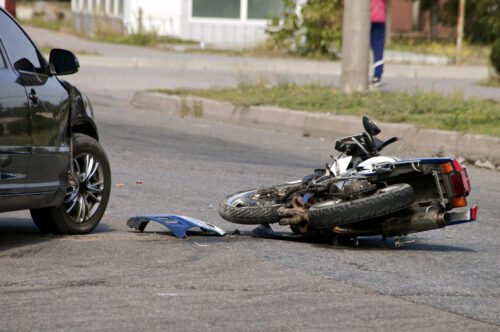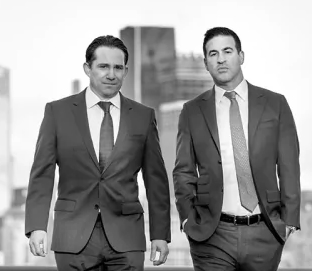
Motorcycle accidents can leave victims with devastating injuries and mounting medical bills. If another party caused your injuries, you understandably want to seek reimbursement. However, you can expect the at-fault party or their insurance company to use every available defense for a motorcycle accident in New Jersey to avoid liability.
Some of the most common defenses to a motorcycle accident lawsuit include comparative negligence, assumption of risk, helmet defense, mitigation of damages, and statute of limitations. Read on to learn more about the common defenses you might encounter in your case. For more specific information on possible defenses in your case, contact an attorney at Glugeth & Pierguidi, P.C.
Comparative Negligence
The most common NJ motorcycle accident defense is comparative negligence. Under this defense, the at-fault party believes that you share partial responsibility for the accident and should not receive compensation for all your damages. Under comparative negligence, you’re assigned a percentage of fault in your case. Then, your compensation is reduced by your percentage of fault. However, if you are more liable for the accident than the other party, you will not recover anything. For example, if your damages are $100,000 and you’re 30% at fault, the maximum you would receive is 70% or $70,000. However, you will receive nothing if you’re 51% or more at fault. Insurance adjusters will try to argue you were the primary one at fault to avoid paying out any compensation.
Assumption of Risk
With an assumption of risk defense for a motorcycle accident, the other driver’s insurance company will argue that you knew the risks inherent in riding a motorcycle and chose to do so anyway. Therefore, you should not be entitled to collect any compensation. For example, the accident occurred on a day with inclement weather. The adjuster will argue that you shouldn’t have been riding a motorcycle that day, and by doing so, you assumed the risk of an accident. This might be a valid defense in rare circumstances, but it’s not the norm.
Sudden Emergency
With a sudden emergency defense, the other party argues they had to take an unexpected and sudden action to avoid a collision, which led to the accident with you. One example is when a driver swerves to avoid hitting a pedestrian or a wild animal. That evasive action results in an unintended collision with you. The defendant must prove they had no option other than to take the action they did under the circumstances.
Helmet Law
New Jersey has a universal helmet law. That means all riders—regardless of age—must wear a Department of Transportation-approved helmet when driving or riding as a passenger on a motorcycle. If you ride a motorcycle without a helmet and are injured, the other party can argue that your injuries would not have been as significant if you were following the law. This could reduce your potential compensation.
No Causation
The other party may argue that they did not cause the accident. For example, the other driver’s insurance company may allege that you hit another vehicle or object before colliding with the other driver.
Statute of Limitations
Another possible defense for a motorcycle accident in New Jersey is that you waited too long to file a lawsuit. The statute of limitations for a motorcycle accident case in New Jersey is typically two years from the accident date. Should you fail to file a lawsuit before the deadline, the court could dismiss your case and bar you from any recovery. There are some exceptions to the two-year deadline. You should verify the filing deadline with a New Jersey motorcycle accident attorney.
No Breach of Duty
Another motorcycle accident defense in New Jersey relates to the legal standard of negligence. There are elements necessary to prove negligence in a motorcycle accident. First, the other driver owes you a legal duty of care to drive reasonably safely. For example, all motorists have the duty to abide by traffic regulations and not harm another person.
The second element of negligence is that the driver breached their duty of care. A driver breaches their duty of care by speeding or driving recklessly. However, if you argue they breached their duty by failing to follow the law, they can defend themselves by claiming they followed all traffic laws and regulations. Therefore, there’s no breach of duty.
Intervening Cause
An intervening cause is any act that breaks the link between the other driver’s actions and your injuries. Intervening causes can be acts of nature or actions by a third party. For example, suppose a bystander tries to help you after the accident and inadvertently causes you additional harm. In that case, the other driver can argue that they should not be held responsible for all your damages.
Failure to Mitigate Your Damages
All victims have a duty to mitigate their damages. This means you cannot recover damages you could have reasonably prevented. You cannot worsen your injuries or costs. If you do so, the other driver may not be responsible for the additional compensation.
For example, let’s say you could not go into the office due to your injuries, but your job offered you the chance to work remotely. You were mentally capable of working remotely, but you turned down this work. Then, you sue the other driver for your lost wages. You had a duty to mitigate your lost wages in this situation, and the other driver can argue that they don’t owe you this compensation.
No Injuries or Damages
Finally, the other driver’s insurance company might argue that you suffered no injuries or damages. An example could be that even though the driver hit you, your injuries were pre-existing or caused by something else. Therefore, the other driver is not responsible for your injuries.
Hire a Skilled New Jersey Motorcycle Accident Lawyer
The best thing you can do for your injury case is to hire an experienced New Jersey motorcycle accident lawyer. Motorcycle accidents are complicated. You need a legal advocate to protect your rights and help you fight for maximum compensation.
An attorney will help gather and preserve evidence and handle all communications with the other driver’s insurance company. That communication includes negotiating a potential settlement on your behalf and representing you in court.
You need an attorney who knows all of the possible defenses the other party may use against you. A skilled attorney at Glugeth & Pierguidi, P.C. can help you navigate the legal system, including any potential defenses to your motorcycle case, and fight for the compensation you deserve. Our attorneys have years of experience representing injured motorcycle victims and know what it takes to build a solid case. We’ll fight for a fair settlement, but we aren’t afraid to take your case to trial, either. We’ve built a reputation for success and will fight tirelessly to help you recover the maximum compensation possible. Don’t hesitate to contact our office today to schedule an initial consultation.


